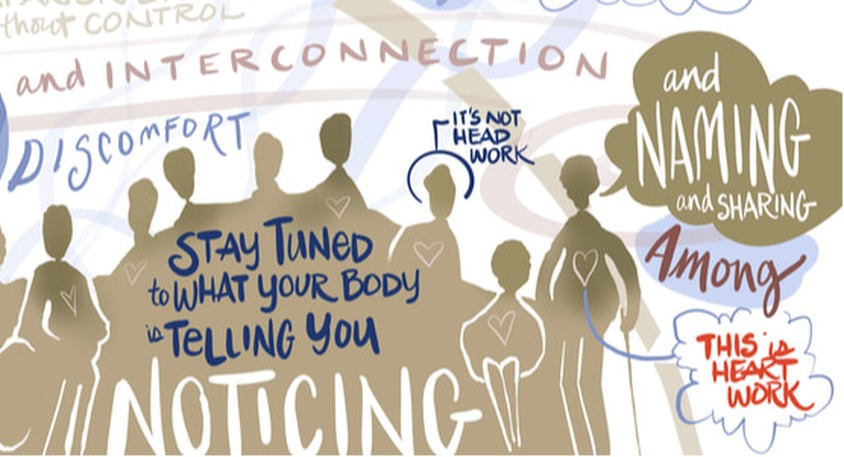|
Laura Park, Beloved Community Staff Team and Director of Membership and Hospitality Each video in the SoulWork series offers ways to think about and develop practice on both sides of the Double Helix model. In the third video, Team Dynamics co-founder and President Alfonso Wenker explores the among practices that move us out of the stage of Minimization on the Intercultural Development Continuum (IDC) into Acceptance, where we have more intercultural competency skills to fruitfully respond to and connect across cultural differences.  Alfonso notes the difficulties of moving out of Minimization, the ways in which the move into Acceptance challenges our comfort, and the ways in which practices of noticing and naming our own physical responses and of noticing and naming the behaviors and practices we’re seeing among us can help us move closer to our church’s multicultural ends. Alfonso provides some wonderful questions we might ask ourselves when we’re together to help us notice and name our practices. The most moving part of this video is at the end, where Alfonso explains HeartWork, the hardest part of leaving ethnocentrism as our home base. Make sure to watch the video to hear his invitation into deeper understanding and practice. SoulWork for You: Spend a week noticing and naming your body’s reactions to cultural differences. What feels hot? Cold? What feels tight or closed? Loose or open? What do you notice about how you’re sitting or standing and where you’re looking? SoulWork for Groups: Invite the groups you meet with at Unity Church to do the same noticing and spend some time unpacking your reactions. When your group members are familiar with the individual noticing practice, move into a practice of noticing together. Set aside time to notice patterns in your group practice, without judgment. In what ways do those patterns move you closer to or further away from the church’s multicultural ends? Also, if you or your group is interested in completing the Intercultural Development Inventory (IDI), a tool that will tell you as individuals or as a group what IDC lens you’re using in intercultural experiences, please contact Drew Danielson, [email protected]. Next: SoulWork#4 – Paradox (Coming July 28) Previous: SoulWork#2 – Presence SoulWork is the term we use at Unity Church for when we engage our Unitarian Universalist faith formation and antiracist multicultural work together. We use a Double Helix model to invite the congregation into this SoulWork and the SoulWork practices, models, tools, and an eight-part video series help us live into increasing complexity on this double helix.
To learn more about SoulWork, please visit our Adult Faith Formation page. There you will find a link to the Double Helix Model of Faith Formation and Antiracist Multiculturalism worksheet to help you develop practices for Within, Among, and Beyond. Visit Unity’s YouTube Channel, SoulWork Playlist to view all eight videos in the series. Image credit: Graphic Recording by DrawingImpact.com
0 Comments
Leave a Reply. |
Topics
All
Beloved Community ResourcesUnity Justice Database
Team Dynamics House of Intersectionality Anti-Racism Resources in the Unity Libraries Collection Creative Writers of Color in Unity Libraries The History of Race Relations and Unity Church, 1850-2005 Archives
July 2024
Beloved Community Staff TeamThe Beloved Community Staff Team (BCST) strengthens and coordinates Unity’s antiracism and multicultural work, and provides opportunities for congregants and the church to grow into greater intercultural competency. We help the congregation ground itself in the understanding of antiracism and multiculturalism as a core part of faith formation. We support Unity’s efforts to expand our collective capacity to imagine and build the Beloved Community. Here, we share the stories of this journey — the struggles, the questions, and the collaborations — both at Unity and in the wider world.
The current members of the Beloved Community Staff Team include Rev. Kathleen Rolenz, Rev. KP Hong, Rev. Lara Cowtan, Drew Danielson, Laura Park, Lia Rivamonte and Angela Wilcox. |
